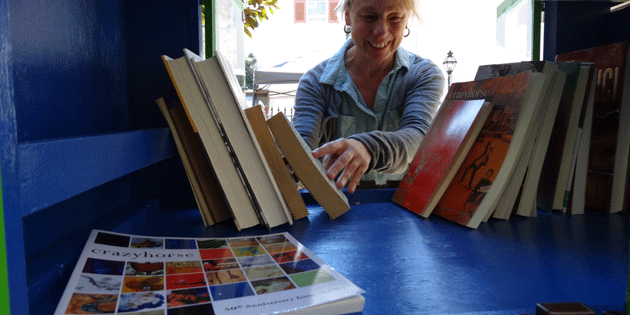The College of Charleston has its first Little Free Library, joining a global network of on-site book exchanges that are spreading a love for books and reading in cities, neighborhoods, parks, universities and other locations around the world.
The Little Free Library was recently installed outside the College’s Department of English at 26 Glebe St. by English professors and married couple Susan Farrell and Joe Kelly.
The concept is straightforward: Build or repurpose a small, enclosed structure, fill it with used books and let bibliophiles take care of the rest. The library works on an honor system: There are no library cards or late fees – just take a book and leave a book.
“If you like it, you can keep it,” says Farrell. “Just bring another one back later.”
The nonprofit organization Little Free Library encourages participants to build libraries from recycled materials and objects – everything from old microwaves and mini-fridges to aging file cabinets and suitcases.
The library on Glebe Street was made out of an old doghouse – one that “the dog never used,” says Farrell. She and Kelly spruced it up with some doors and a coat of blue and lime green paint. They also installed a drawer for magazines.
 The library is actually the couple’s second Little Free Library. They built their first one last summer using an old lectern and installed it in front of their house in West Ashley. Seeing the joy that her neighbors and other passersby got out of the library encouraged Farrell to bring the idea to campus. Her office is located at 26 Glebe St., so she can easily check on the library’s holdings and tidy up when needed.
The library is actually the couple’s second Little Free Library. They built their first one last summer using an old lectern and installed it in front of their house in West Ashley. Seeing the joy that her neighbors and other passersby got out of the library encouraged Farrell to bring the idea to campus. Her office is located at 26 Glebe St., so she can easily check on the library’s holdings and tidy up when needed.
Farrell and Kelly seeded the library’s initial stock from their own book collections. Farrell donated several copies of one of her favorite books, Tim O’Brien’s “The Things They Carried,” which was the 2009 selection for The College Reads! program.
Kelly contributed a copy of a book he authored in 2013, “America’s Longest Siege: Charleston, Slavery, and the Slow March Toward Civil War.”
All of those original books, including several novels and Western civilization textbooks, are now gone, replaced with titles left by patrons. On a recent afternoon, book browsers could choose from among a James Patterson novel, a biography of Tarzan creator and author Edgar Rice Burroughs, the bestselling novel The Da Vinci Code, or a number of other titles.
Though many of the current books skew toward literature, Farrell says she hopes to expand the offerings as more people become aware of the library. “I’d like to see more books about math and science,” she says. “We’d like everyone on campus to use it.”





